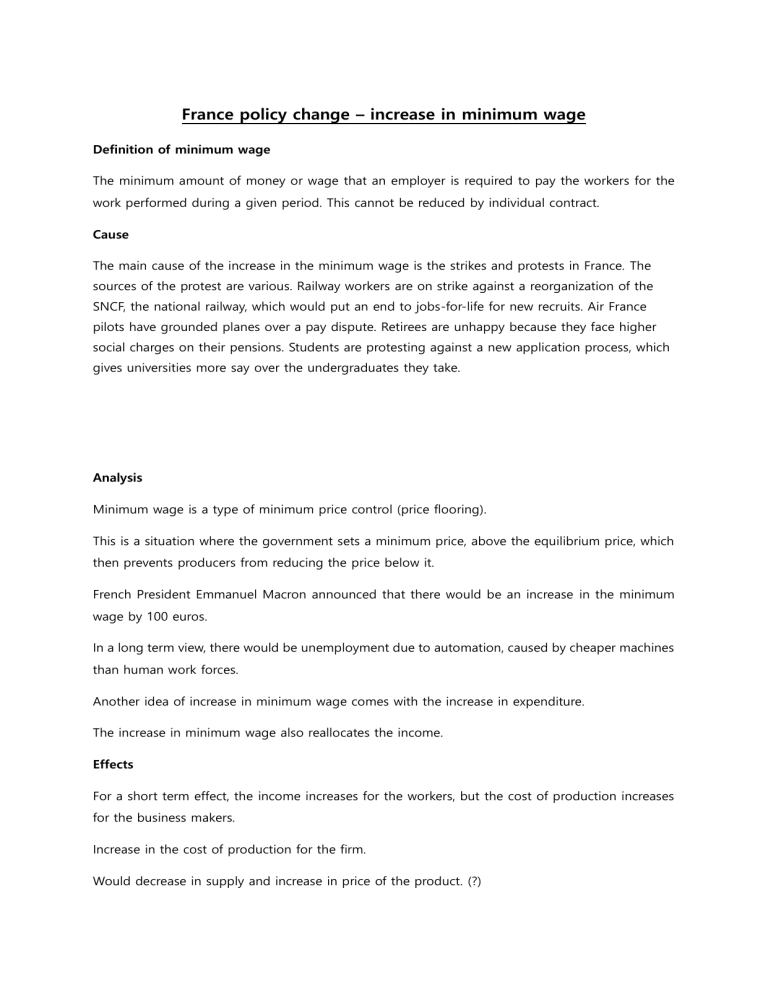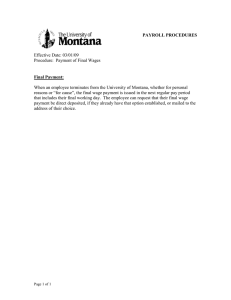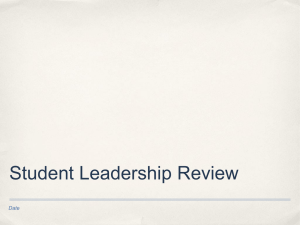France Minimum Wage Increase: Analysis & Effects
advertisement

France policy change – increase in minimum wage Definition of minimum wage The minimum amount of money or wage that an employer is required to pay the workers for the work performed during a given period. This cannot be reduced by individual contract. Cause The main cause of the increase in the minimum wage is the strikes and protests in France. The sources of the protest are various. Railway workers are on strike against a reorganization of the SNCF, the national railway, which would put an end to jobs-for-life for new recruits. Air France pilots have grounded planes over a pay dispute. Retirees are unhappy because they face higher social charges on their pensions. Students are protesting against a new application process, which gives universities more say over the undergraduates they take. Analysis Minimum wage is a type of minimum price control (price flooring). This is a situation where the government sets a minimum price, above the equilibrium price, which then prevents producers from reducing the price below it. French President Emmanuel Macron announced that there would be an increase in the minimum wage by 100 euros. In a long term view, there would be unemployment due to automation, caused by cheaper machines than human work forces. Another idea of increase in minimum wage comes with the increase in expenditure. The increase in minimum wage also reallocates the income. Effects For a short term effect, the income increases for the workers, but the cost of production increases for the business makers. Increase in the cost of production for the firm. Would decrease in supply and increase in price of the product. (?) It causes unemployment because the increase in the minimum wage encourages the firm owners to reduce their human workforces. In fact, eventually, non-human capitals such as self-checkout counters would be introduced to many shops. (automation) The other part is that since more people have more income, they are going to spend it, more going out to eat, more cloths, more movies etc. This is why the increase in minimum wage will be on the lower end of the scale, because while it’s more expensive to hire the workforce, firm owners are also going to get a good jump in business. (counter) The only real victim here is the small business that is just scraping by right now, these people will probably have to close and while that is sad, if they haven't turned decent profit within the first 23 years their chances of closing are extremely high anyway. Example If the current wage is 7.25$ an hour and government raises to 15%, which is 7.75$ increase. According to the source, one-time increase in minimum wage brings about 2 to 7% of increase in price. Say the meal costs you 10$, than the price would go up based on the increase in minimum, in this case, it’s around 20 to 70 cents. “By looking at changes in restaurant food pricing during the period of 1978–2015, MacDonald and Nilsson find that prices rose by just 0.36 percent for every 10 percent increase in the minimum wage, which is only about half the size reported in previous studies. They also observe that small minimum wage increases do not lead to higher prices and may actually reduce prices. Furthermore, it is also possible that small minimum wage increases could lead to increased employment in lowwage labor markets.” Apple is another example. iPhone 8+ production cost in total from base material to delivered phone in a box at the apple store is about 300$ per unit. They sell for $800+ a unit, so 500$ profit after shipping. Even if the firm take 100$ off that for marketing, still looking at 400$ profit. They could hire a bunch of factory workers in the states and they would still make around 250300$ profit per phone, but they won't because of greed. We need more regulation to fix this issue. It is probably going to require a tax rework, heavy import taxes and penalties for companies who make the majority of their goods overseas.


